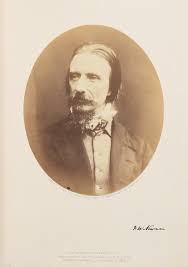
F. W. Newman
Francis William Newman (27 June 1805 - 4 October 1897), the younger brother of Cardinal Newman, was an English scholar, miscellaneous writer and vegetarianism activist. Born in London, Newman and his brother were both educated at Ealing, and subsequently at Oxford, where he had a distinguished career, obtaining a double first class in 1826. He was elected fellow of Balliol in the same year. In 1827 he went to Delgany, co. Wicklow, where for a year he tutored the sons of Edward Pennefather and fell under the influence of Pennefather's brother-in-law, the Rev John Nelson Darby, one of the nascent group of Plymouth Brethren, who he describes in Phases of Faith as "the Irish Clergyman". Conscientious scruples respecting the ceremony of infant baptism led him to resign his fellowship in 1830, and he went to Baghdad as assistant in the faith mission of Anthony Norris Groves. This journey, which included wives, a baby in arms, and an elderly woman, has been described as "a mad jaunt whose real tragedy — two of the wives died and the men of the party were many times near death — is blurred by silly incompetence and downright nonsense of most of its members." In 1833 he returned to England to procure additional support for the mission, but rumours of unsoundness in his views on the doctrine of eternal punishment had preceded him, and finding himself generally looked upon with suspicion, he gave up the vocation of missionary to become classical tutor in an unsectarian college at Bristol. His letters written home during the period of his mission were collected and published in 1856. After his retirement from University College, Francis W. Newman continued to live for some years in London, subsequently removing to Clifton, and eventually to Weston-super-Mare, where he died in 1897. He had been blind for five years before his death, but retained his faculties to the last. Although for most of his life, he preached a kind of rational-mystical agnosticism., in his old age, he returned to the Church of England. He was twice married.

